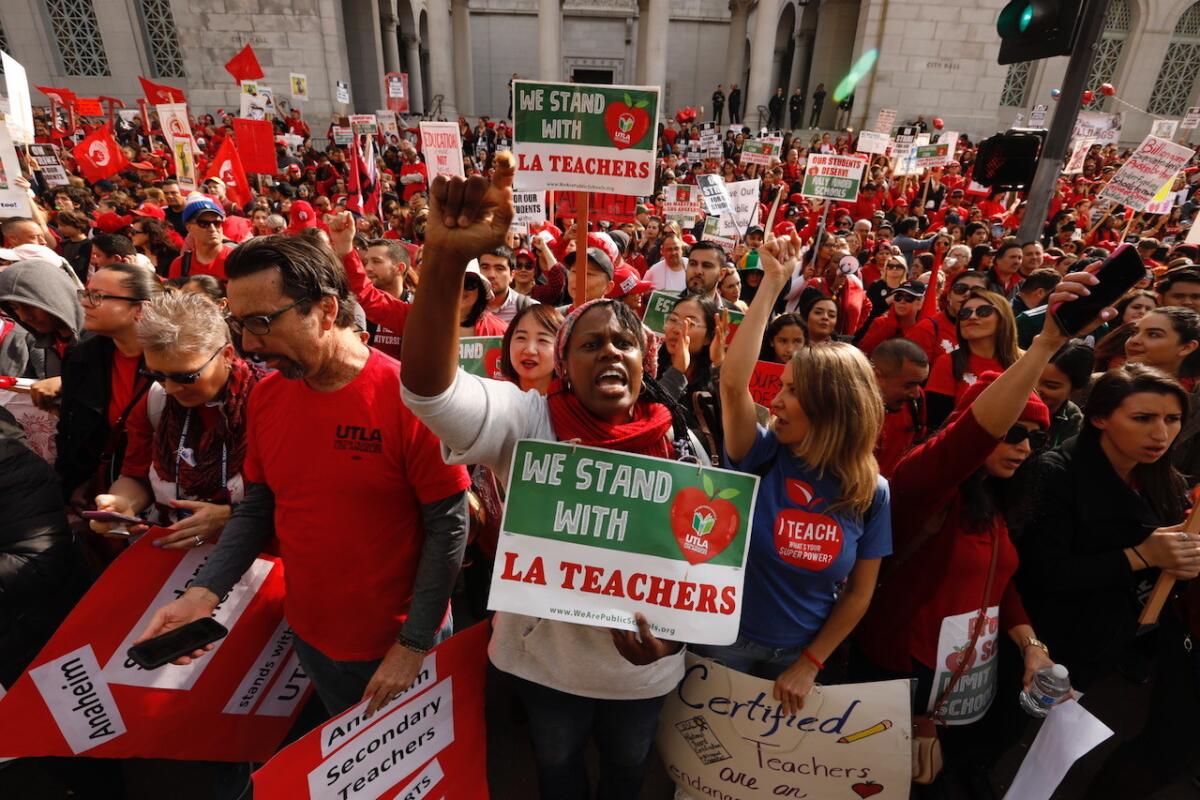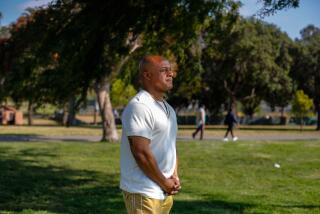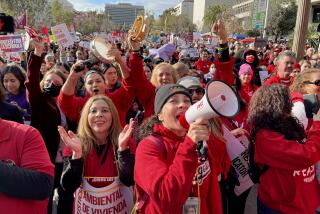This election is off-limits to voters. But the results will matter a lot to L.A. school families

One ballot this season is off-limits to the public but carries far-reaching ramifications for hundreds of thousands of youths and their families — the election of a new president and other officers for the Los Angeles teachers union.
United Teachers Los Angeles President Alex Caputo-Pearl, who led 30,000 teachers in a strike that gripped Los Angeles last year, is barred by term limits from running for a third three-year term. His replacement will instantly become a major voice in the nation’s second-largest school system and the leader of a union that has long influenced education policy in Los Angeles. The winner also will confront internal challenges, including the mobilization of anti-union groups that seek to persuade members to abandon UTLA entirely.
“The UTLA elections always matter,” said Tyrone Howard, professor of education at UCLA’s Graduate School of Education and Information Studies. “They are an important player in the educational landscape in Los Angeles. They shape board elections, influence policies and have a critical voice in the current and future makeup of Los Angeles.”
Just a year ago, the union’s leadership led members in a momentous six-day strike — and won broad sympathy for teachers who rallied public attention to difficult working conditions and their crucial mission to educate Los Angeles’ most underserved youth. The union election represents an internal referendum on how all that worked out, whether the gains of the strike justified losing six days of instruction and 3% of last year’s salary.
“Many members are questioning what they gained,” said Howard, and the election will determine how the union wields its influence going forward and the extent to which it remains “a critical voice in school reform.”
“The right leader can hurt or hinder that process,” he added.
UTLA often has changed the classroom or political equation. In the 1990s, when the union couldn’t win raises, it pushed for greater control over schools and classrooms, winning the right for teachers — not principals — to in many cases choose which grade levels or courses they taught.
The union also won the ability for members to earn lifetime health insurance. The cost has created financial strains for the Los Angeles Unified School District, but supporters see that benefit as a valuable recruitment tool.
More recently, UTLA was among the first unions to push back successfully against a nationwide trend to rate teachers based on student standardized test scores.
Teachers unions remain among the most powerful interest groups in California — they played a key role in last year’s legislation that could limit the growth of new charter schools. However, long-term union influence has been threatened by a 2018 Supreme Court ruling that allows public employees to stop paying fees to the unions that represent them. One internal goal of the L.A. strike was to build solidarity and membership.
In an unusual, perhaps unprecedented move, Caputo-Pearl is vying to remain a key part of the leadership team he helped assemble. He’s campaigning for one of four vice president slots, hoping to swap roles with Cecily Myart-Cruz, who is running for president on their Union Power slate, which includes candidates for all seven citywide offices.
Inevitably, the late February results will be viewed as a vote either for or against Caputo-Pearl and his team, who, as full-time union officers, earn about $115,000 a year.
Another sort of reckoning will follow closely. The March 3 presidential primary ballot will include four of the seven L.A. school board seats. A shift of even one seat could threaten the current union-friendly majority on the board.
In board elections, the two major financial players have been the teachers union and charter school advocates, each with its favored candidates. Both spend big, although the charter supporters have spent more, with the teachers union trying to compensate with its ground troops of union members.
The message from union leadership is that last year’s strike was triumphant, achieving smaller class sizes, as well as the hiring of more nurses, librarians and counselors — all of whom are among some 32,000 voting members. Union Power counts some of the biggest gains in nontraditional bargaining areas, such as expanded social services at more schools.
“Why wouldn’t we continue to move forward the powerful work we have all accomplished together?” said Myart-Cruz, a 25-year teacher who has risen through union ranks. “It would be a mistake to not continue to build off the strike, relationships, movement building and groundbreaking work of the past years.”
Within the union, her platform includes developing future leaders, especially women and people of color. Within schools, she wants teachers to gain control over teacher training and opposes the sharing of campuses with privately operated charter schools, which compete for students with district-operated schools.
Charter schools, most of which are nonunion, are typically criticized in union elections, although about 900 charter school teachers are also represented by UTLA. About 1 in 5 L.A. Unified students attend charters, an increase since the last union election.
The Union Power slate is being challenged by candidates with conflicting viewpoints: Some find the incumbents too militant; others not militant enough.
Soni Lloyd, one of five running for president, criticizes the union for backing school board candidates who fail to aggressively oppose charter schools, saying that as a result, “LAUSD is dying a slow death.”
“It is tempting to look at a few minor changes from the strike and declare a big change, but one has to look at overall trends,” he said, calling for “a permanent strike-like climate of public outreach until we have real breakthroughs.”
Marisa Crabtree, a veteran English teacher at Lincoln High School who is running for UTLA president, faults the union leadership for being too engaged in outside politics.
“It is not my goal to make UTLA a ‘political powerhouse’ as it’s been deemed under Caputo-Pearl’s tenure,” Crabtree said. “It is my job to resource, protect and defend every educator within LAUSD to do what it is we all signed up for — to build an educational powerhouse.”
She’s running as part of a slate called Elevated 2020.
Also running for president is veteran secondary English teacher Innocent Osunwa, who could not be reached for comment. Osunwa, who has run previously, calls for better job protections and improved working conditions in his campaign materials.
Candidate Greg Russell, a secondary substitute teacher for 23 years, said he wants a more democratic union, with recorded meetings that members could view. He was especially critical of Caputo-Pearl’s effort to remain a citywide officer, calling it a maneuver to remain in control.
Caputo-Pearl said such concerns are misplaced.
“I want to continue building our momentum, working under Cecily,” Caputo-Pearl said. “Working in L.A. — the epicenter of underfunding and privatization — with UTLA members, is the most important thing to do in the United States in the fight for public education.”
Caputo-Pearl’s opponents for vice president are Gabriel Serrano, who is part of Crabtree’s slate, and Wil Page, a veteran union activist and King Middle School technology coach. Page participated enthusiastically in the strike, but he said union leaders lacked a solid “strike exit plan” and have not developed a strong political strategy for electing sympathetic and capable school board members.
More to Read
Start your day right
Sign up for Essential California for news, features and recommendations from the L.A. Times and beyond in your inbox six days a week.
You may occasionally receive promotional content from the Los Angeles Times.







